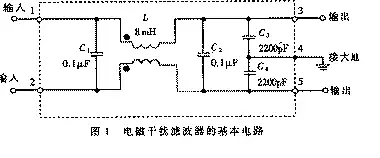POP_UP_MESSAGE_CONTENT


RF interference suppression filter: a powerful tool for interference suppression in mobile communication networks

The suppression of radio frequency interference filter usually consists of a filter chip, a filtering circuit, and a control circuit. The filter chip is the core component that analyzes the frequency spectrum of interference signals and generates corresponding filtering characteristics to achieve the function of filtering out interference signals. Filter circuits are responsible for applying filtering characteristics to practical signal processing, typically constructed using components such as capacitors, inductors, and semiconductors. The control circuit is used to control the working state of the filter, usually implemented through software programs or hardware circuits.
RF interference suppression filters can be classified into various types based on their filtering characteristics and application scenarios. Common types include low-pass filters, high pass filters, band-pass filters, and band stop filters. Low pass filters are mainly used to filter out high-frequency interference signals and retain low-frequency communication signals; High pass filters are mainly used to filter out low-frequency interference signals and retain high-frequency communication signals; Bandpass filters are mainly used to filter out interference signals in specific frequency bands and retain communication signals in other frequency bands; Bandstop filters are mainly used to filter out communication signals in specific frequency bands.
RF interference suppression filters have a wide range of applications in mobile communication networks. It can be applied to multiple aspects such as base station equipment, antenna equipment, wireless access equipment, and terminal equipment, playing an important role in the anti-interference ability of the entire communication system. In base station equipment, the RF interference suppression filter can filter out wireless signal interference from other frequency bands, ensuring the normal operation of the base station; In antenna equipment, the suppression RF interference filter can filter out RF signal interference from other directions and improve communication quality; In wireless access devices, RF interference suppression filters can filter out interference signals from other network devices, enhancing the transmission distance and reliability of signals; In terminal devices, RF interference suppression filters can filter out interference signals from other wireless devices, providing a better communication experience.
The application of RF interference suppression filters still faces some challenges. Firstly, the spectral characteristics of radio frequency interference signals are diverse and require continuous updating of filtering features to adapt to new interference signals. Secondly, the design and manufacturing costs of filters are relatively high, and the feasibility of commercial production needs to be considered. Again, the performance and parameters of the filter also need to be accurately measured and calibrated to ensure that its actual effect meets the design requirements.
In short, as a powerful tool for interference suppression in mobile communication networks, RF interference suppression filters play an important role in improving the anti-interference ability of communication systems, ensuring communication quality and stability. With the continuous development of mobile communication technology, the suppression of radio frequency interference filters will also continue to evolve and improve, providing better support for the construction and development of mobile communication networks.












